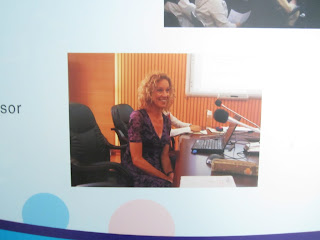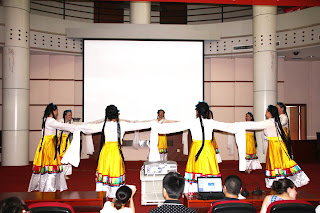 |
| historic site, across street from campus, Gele Mnt in background |
I have lived in China for 1
year and 1 month. At times, it felt like
time passed so quickly, but most of the time, it felt like slow motion. The pace of life is much slower, even in the
mega-huge city of Chongqing, where everyone naps during almost 3 hour lunch
breaks. It’s common to see people
sleeping at work, even at restaurants and stores. I never adopted the nap habit, but my life
has been less frantic: no tight schedules, no multitasking. I feel like I have a different perspective on
time now.
My main job was part-time
since I taught only 3 days a week and I only had to prepare 3 lessons a
week. Most university teachers have a
similar schedule. They don’t have offices and they don’t hold office
hours, but many conduct research. It’s not clear they even meet
with students. I held office hours each
week for my students and I met them for lunch, dinner, walking, shopping, or
whatever. They helped me understand
China and I helped them understand the U.S.
My secondary projects were
flexible, like going to English corners.
I did things as I had time and motivation. Basically, my policy was if the dean or
teachers in my department asked me for help, I always said yes. Other requests, from other departments or the
community, I mostly said yes, like if graduate students from other universities
asked me for help with a paper or a speech, I usually did.
I had time every day to
relax, do the things I enjoy most, and try things I rarely do at home. I spent time everyday exercising, reading, buying
and preparing food, watching movies or TV shows, and trying something new. I went to bed early, got up early. For the first time in my adult life, I regularly
got 7-8 hours of sleep each night.
At first, I was anxious to
fill my time; I’ve always been a doer, a to-do list keeper, a goal setter. I didn’t keep any list and it was OK! I survived a year of no lists.
I survived a year of living
with next to nothing.
But, doing everything felt
like it took more time and effort in China.
Every morning, I had to check if I had enough drinking water for the
day. Just getting around in such a
massive, crowded city could be stressful, time consuming, and exhausting.
Now that one year is over, I
am more grateful than ever for all that we have in the U.S.
What did I learn this past
year? Culture is everything. The Chinese lifestyle is vastly different
from our American lifestyle and they believe, just as we do, that their way is
absolutely right. What does such a
conflict of culture mean for current and future US-China relations?
For my part, I feel that I
made a miniscule dent in cultural barriers.
One year later, I have a better understanding of Chinese culture and I
hope that my students and the community people I met have a better understanding
of American culture. In that way, my
year in China has been 100% worthwhile.
 |
| part of hallway display with pictures and explanation on "The Experimental Center for Foreign Affairs," ... not really sure what it's about, but I was a part of it |
 |
| giving a presentation |




































































